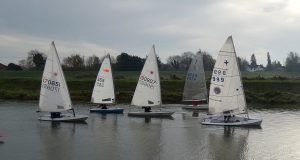Research by a Spalding company has shown that science is the most popular subject with schoolchildren.
Out of 3,000 national curriculum quizzes offered by Spalding-based online resource Education Quizzes over the last two years, the top three most popular were science-based.
More than 72,000 youngsters opted to answer questions on ‘acids and alkalis’ while the categories for ‘atoms and elements’ and ‘adaptation of animals and plants’ were each taken on by more than 30,000 students.
Colin King, managing director at Education Quizzes which has its offices at Wragg Marsh, said: “There have been reports in the media recently that fewer children are opting to take science subjects in UK schools so it is surprising to see that science is so popular with our subscribers.
“We have 15,000 visitors to our site every day so these statistics do indicate genuine trends taking place in education in this country.”
Other findings revealed by the database of Education Quizzes:
- Most correct answers was for a Key Stage 3 science question asking which pH numbers had the strongest alkali level – 88% (63,655) students got it right.
- One of the most difficult questions for students was a GCSE physics one asking them for the formula to calculate the size of an electric current – only half of them gave the correct answer.
- 96% of Key Stage 2 pupils knew London was the capital city of England
- 94% of Key Stage 3 maths students were able to correctly identify a right-angle
Education Quizzes, which can now be used free of charge by schools for a year, has also this week launched a monthly competition with prizes worth hundreds of pounds to help provide more motivation to children to improve their quiz scores, and ultimately their learning.
The latest prize, for the student who attains the most 10 out of 10 correct answers on quizzes in July, is a Celestron computerised reflector telescope, worth £250. Winners must be aged 18 or under.
Questions are available on the website for children aged five at KS1 level through to 17-year-old GCSE students. There is also a section for youngsters for whom English is a second language.
Mr King added: “We have access to figures showing how everyone is doing when they have a go at one of our quizzes. We thought it would be a good idea to add a competitive element and put up a prize each month.
“This will also help parents when it comes to asking their children to work hard at their revision. The more they learn, the better the chance they have of winning a great prize.”
Education Quizzes – which was launched by Colin and Lisa King in March 2012 – is also inviting children to send in stories and photos to do with nature with the best ones to be posted on its website www.educationquizzes.com
Mr King continued: “We know from the huge interest we have received in our blogs that children are really interested in nature so we want to encourage them to write about it.”
Nature stories and photos should be sent to Graeme Haw at graeme@educationquizzes.com
Nature stories and photos should be sent to Graeme Haw at graeme@educationquizzes.com
 The Voice of Spalding and South Holland
The Voice of Spalding and South Holland



